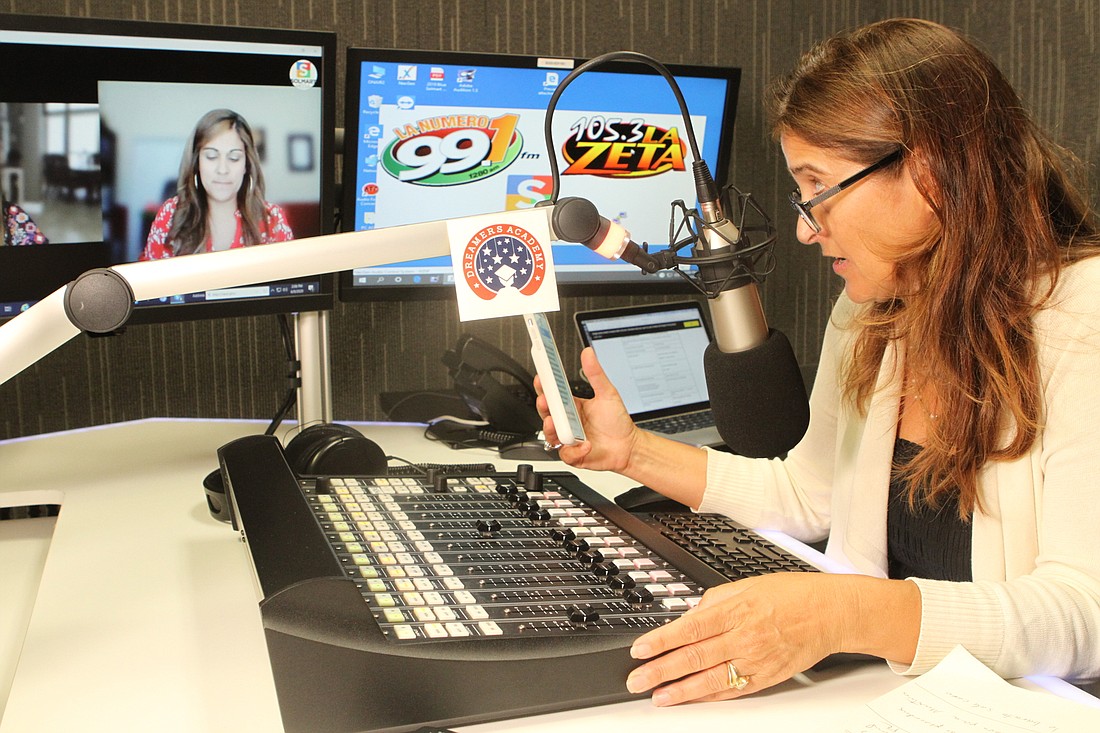- April 19, 2024
-
-
Loading

Loading

When distance learning began in Florida, many families had questions. However, some of them couldn’t get the answers they sought because they didn’t speak the language.
A new radio show is hoping to change that.
After nearly three decades working for CNN Español and Univision News, Mercedes Soler and her husband, Tom Martinez, a former radio executive, bought Solmart Media.
The couple was inspired to buy the station, which broadcasts throughout 10 Florida counties, after seeing a lack of Spanish language radio in Florida.
“We looked around Florida for underserved communities,” Soler said. “We feel like where we are is really an untapped market. The counties that we serve have about 300,000 Hispanics, and that’s a very robust amount of people that aren’t being served by local media.”
As Soler began covering the effects of COVID-19, she contacted Sarasota’s Geri Chaffee, who founded dual-language charter school Dreamer’s Academy, to speak about the effects of distance learning on students.
“By the time we finished the interview, I said to her: ‘We have to do a show. This isn’t enough. There’s going to be a long road, and we really need to help parents,’” Soler said.
From there, a half-hour program titled “Por Nuestros Niños,” or “For Our Children,” that focuses on the educational needs of Spanish-speaking students began.
It airs at 10:30 a.m. Sundays and 11:30 a.m. Mondays on “La Zeta” 105.3 FM, “La Número Uno” 99.1 FM and 1280 AM. Listeners may also tune in online.
Chaffee, who is now the host of the show, talks in Spanish to school officials throughout Florida about different educational problems affecting students as they are distance learning.
“There’s a lot of cultural and linguistic barriers,” Chaffee said. “Most of the teachers are beautiful English-speaking teachers that are totally dedicated, but when you have parents not understanding the language, it’s difficult to fully comprehend what a child needs.”
The first episode, “No hay mal que por bien no venga” (a saying similar to “Every cloud has a silver lining”), focuses on finding the good in the bad and offers distance learning tips to help parents. The second, “Leer para crecer y crecer leyendo” (“Read to grow and grow reading”), focuses on the importance of reading to and by children.
Although she was excited to help bring such programming to Florida communities, Chaffee, who had never worked in broadcast before, was nervous. However, after recording about 25 episodes, Chaffee said the response to the show has been great.
“I didn’t realize that radio has such a huge market penetration with a lot of our now-considered essential workers,” she said. “Spanish radio gives them a local connection.”
The show has been such a success that the station has begun turning the segments into podcasts, so people don’t have to tune in live to get the information.
School districts and the American Federation of Teachers have asked to participate in segments of the show, so they can share the resources with parents. In one episode, Stephen Covert, the principal of Pine View School for the Gifted, talks about the concept of giftedness in the Spanish-speaking community.
“Mercedes just had this idea which grew out of love, and all of a sudden we’ve hit an untapped market for information where people are lining up to be a part of the show,” Chaffee said. “It’s been very humbling.”
Soler agreed, stating it has been incredible to see the response.
“The common theme here is to empower parents with the information they need to be able to support their children academically, not just now but later on as we continue in these education systems that previously a lot families didn’t have access to because of a lack of understanding,” Soler said.